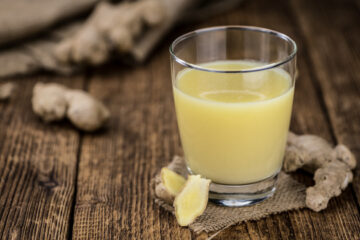The Milk Debate: Is dairy milk the best, or are plant-based milks better?
Every one of us has tried milk. In the beginning, when we were babies, our first food was milk. Over the years and with the development of civilisation, milk substitutes began to appear on the market. In addition, changes in dietary preferences, but also predispositions, such as lactose intolerance or an allergy to cow’s milk protein, for example, led manufacturers to invent substitutes for cow’s milk. Nowadays we have a wide range of plant-based milks/beverages. Today, milks, and plant-based drinks are available in almost every shop. But are they wholesome? Do they have a similar mineral and nutrient content to cow’s milk and which of these milks will work best for you?
How do we choose the best milk for us?
First of all, we should be guided by our health. Do we have a lactose intolerance or a cow’s milk protein intolerance? Then we should consider our taste preferences. There are many options on the market today. Cow’s milk, goats and sheeps milk) as well as plant-based milk drinks (oat, almond, soya, coconut, pea, rice and others).
Macronutrient values of milks per 100 ml
- Whole cow’s milk – contains 66 kcal; 3.5g protein, 4.7g carbohydrate, 3.7g fat
- Almond milk – contains 30 kcal; 0.9g protein; 1.5g carbohydrate; 2.1g fat
- Soya milk – contains 41 kcal; 3.2g protein; 1.7g carbohydrate; 1.4g fat
- Oat milk – contains 54 kcal; 1.6g protein; 6g carbohydrate; 2.1g fat
The energy value and protein content are similar for soya and cow’s milk. The main noticeable difference between all is in the carbohydrates. The highest carbohydrate content is found in oat milk followed by cow’s milk. It is worth adding that vegan milk alternatives are often fortified, i.e. enriched with various other valuable ingredients such as vitamins and minerals. The most commonly added are calcium, zinc, magnesium and B vitamins and vitamin D. Note that organic vegan milk substitutes are not fortified. Cow’s milk itself contains many of these nutrients naturally, especially iodine, potassium, calcium and vitamin B12.
Calcium
Calcium is an essential element for the proper functioning of the human body. It is the basic building material of bones and teeth. It also regulates the functioning of the nervous system, and influences muscle function and hormone secretion. Cow’s milk is a rich source of calcium, with 120 mg per 100 ml of milk, and plant milks have a similar content (once fortified). The highest calcium content is found in almond plant milk.
Vitamin B12
Vitamin B12 is an important vitamin with many functions in our body. It is essential for the formation of red blood cells. In addition, it has a beneficial effect on the functioning of the nervous system by supporting the synthesis of such important neurotransmitters as dopamine and serotonin, for example. Vitamin B12 is also essential for the active form of folic acid, which plays a special role for pregnant women and those planning pregnancy. A glass of cow’s milk contains approximately 46% of the daily recommended intake of vitamin B12 for adults. Vegetable milks also contain vitamin B12 when they are fortified, which is important especially for those on vegetarian and/or vegan diets.
Milk and Exercise
Dairy milk can play a great part in nutrition around exercise. It is a source of carbohydrates for energy before exercise, and even post exercise it will provide a great balance of carbohydrates, protein and electrolytes for recovery. Not to mention it will rehydrate you too! Milk is a source of protein which is essential for post-exercise recovery.
Milk and the environment
Looking after our environment is a very important issue, so much so that when choosing a product from the supermarket shelf, we consider or check what the potential consumption might be and what product is more environmentally friendly. Below is a breakdown of cow’s milk and plant milks (on average) in terms of environmental factors.
|
|
Cow’s milk |
Plant-based milk |
|
Land use |
4 km2 |
0,25 km2 |
|
Water |
120 L per glass of milk |
5-70 L per glass of milk |
|
Gases |
More than 0.5kg greenhouse gas emissions |
0.1-0.2kg per glass of milk |
|
Price group |
cheaper |
expensive |
As you can see, plant- based milks are superior when it comes to the environment and resource use. However the cost of these milks are higher than cow’s milk.
What to look out for when buying plant-based drinks?
– Fortification with Calcium, B Vitamins (Riboflavin and B12), Vitamin D and Iodine
– High content of the main ingredient in the drink
– No added sugar
– No thickeners, emulsifiers, stabilisers, acidity regulators or flavourings
Overall, what are our thoughts?
Firstly, what is your reason to switch to plant-based milks? If it is for the environment or animal welfare reasons, these are great reasons to reduce or stop your dairy intake and switch to a plant-based milk. Though it if it is for health reasons, we would question if plant-based milks are superior for health than cow’s milk, especially given the lack of protein in most and some often contain added sugars. There is no nutritional need to stop drinking cow’s milk, as dairy can be nutritious with the varied vitamin & mineral content, as well as protein levels.
Secondly, what do you enjoy? If you are not a big fan of cow’s milk in cereals or smoothies, but you like it in your tea or coffee, why not include it alongside a plant-based milk for breakfast time? But if you are drinking a plant-based milk thinking it is better for you, but you are hating the taste, please don’t! Switch back to cow’s milk if it’s what you truly like. Be mindful of overall dairy consumption for environmental reasons and choose what you enjoy.
Thirdly, think of the cost element. Cow’s milk is a much less expensive option than plant-based milks, so if budget is a concern, you may want to re-consider buying cow’s milk in favour of the variety of more costly plant-based milks.
Overall, there isn’t a specific ‘best’ type of milk, but it’s a combination of ethical and environmental factors as well as nutrition that needs to be considered, when we choose what to go for.
By Martyna Slotwinska, Dietetic intern, revised by Reema Patel, Registered Dietitian at Dietitian Fit & Co.
References
Fructuoso i in., An Overview on Nutritional Aspects of Plant-Based Beverages Used as Substitutes for Cow’s Milk”, Nutrients, t. 13, nr 8, s. 2650, lip. 2021, doi: 10.3390/nu13082650.
Giannetti, G. Toschi Vespasiani, G. Ricci, A. Miniaci, E. di Palmo, i A. Pession, „Cow’s Milk Protein Allergy as a Model of Food Allergies”, Nutrients, t. 13, nr 5, s. 1525, kwi. 2021, doi: 10.3390/nu13051525.
Potential Protective Protein Components of Cow’s Milk against Certain Tumor Entities – PubMed”. https://pubmed.ncbi.nlm.nih.gov/34201342/ (dostęp 21 grudzień 2022).
C. Pereira, „Milk nutritional composition and its role in human health”, Nutr. Burbank Los Angel. Cty. Calif, t. 30, nr 6, s. 619–627, cze. 2014, doi: 10.1016/j.nut.2013.10.011.







